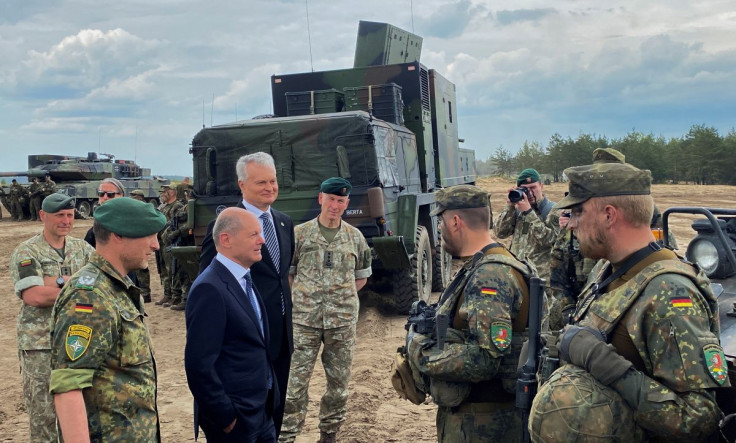Germany To Boost Military Mission In Lithuania

Germany is ready to ramp up its military mission in Lithuania in response to Russia's invasion of Ukraine, German Chancellor Olaf Scholz said during a visit to Vilnius on Tuesday.
"We are ready to strengthen our engagement and to develop it towards a robust combat brigade," Scholz told reporters after meeting with Lithuanian President Gitanas Nauseda and the prime ministers of Latvia and Estonia.
"We will defend every centimetre of NATO's territory," he added.
German government sources said Berlin would earmark one combat-ready brigade with some 3,000 troops that could be deployed quickly to defend Lithuania if necessary.
The number of German troops in Lithuania would be ramped up to 1,500, from 1,000 at the moment, the sources said.
This could be followed by expanding the multinational German-led NATO combat unit in Lithuania to the size of a brigade in the longer term, Scholz and Nauseda said in a joint statement.
For Nauseda, this means the brigade will be based in Lithuania in no more than one-and-a-half years, he told reporters after visiting German troops stationed at the Pabrade military base.
The German-led multinational battalion of originally about 1,000 troops was sent to Lithuania after Russia annexed Crimea, to stall a Russian attack until reinforcements arrive.
The Baltics now expect more troops from Canada and Britain, which are in charge of similar NATO units in Latvia and Estonia, Nauseda told reporters.
Berlin sent hundreds of additional troops to Lithuania in the immediate aftermath of Feb. 24 Russia's invasion of Ukraine, which Moscow calls a "special military operation".
Asked about reports that Spain plans to send German-built Leopard main battle tanks to Ukraine, Scholz said Berlin has not yet received an export request from Madrid.
Spain wants to supply Ukraine with anti-aircraft missiles and Leopard tanks, according to government sources cited by newspaper El Pais on Sunday. [L1N2XS048]
Germany has so far refused to deliver Western tanks to Ukraine.
Scholz has been criticised for sending mixed messages after triggering high expectations abroad with the announcement of a "Zeitenwende", or turning point, and the injection of 100 billion euros into the German military three days into the Russian invasion.
It was a major policy shift after decades of military restraint that were rooted partly in Germany's bloody 20th-century history and resulting pacifism but Ukraine has accused Scholz of dragging his feet on the delivery of heavy weapons to Kyiv.
The German army - the Bundeswehr - itself has severe shortcomings in equipment after decades of attrition following the end of the Cold War. At present it he Bundeswehr, has not a single constantly combat-ready brigade to defend German territory.
© Copyright Thomson Reuters 2024. All rights reserved.







